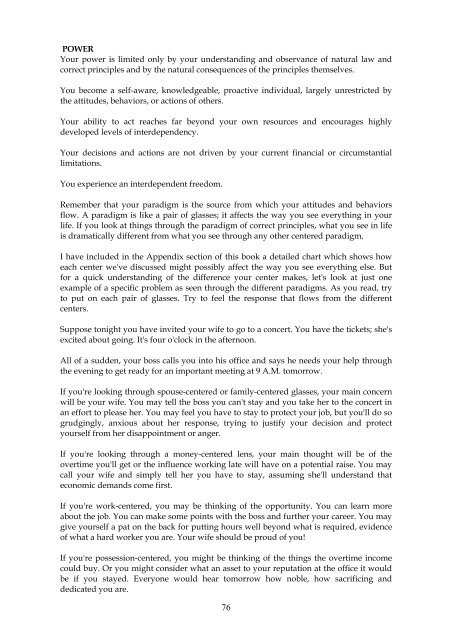Covey - The 7 habits of highly effective people
Create successful ePaper yourself
Turn your PDF publications into a flip-book with our unique Google optimized e-Paper software.
POWER<br />
Your power is limited only by your understanding and observance <strong>of</strong> natural law and<br />
correct principles and by the natural consequences <strong>of</strong> the principles themselves.<br />
You become a self-aware, knowledgeable, proactive individual, largely unrestricted by<br />
the attitudes, behaviors, or actions <strong>of</strong> others.<br />
Your ability to act reaches far beyond your own resources and encourages <strong>highly</strong><br />
developed levels <strong>of</strong> interdependency.<br />
Your decisions and actions are not driven by your current financial or circumstantial<br />
limitations.<br />
You experience an interdependent freedom.<br />
Remember that your paradigm is the source from which your attitudes and behaviors<br />
flow. A paradigm is like a pair <strong>of</strong> glasses; it affects the way you see everything in your<br />
life. If you look at things through the paradigm <strong>of</strong> correct principles, what you see in life<br />
is dramatically different from what you see through any other centered paradigm.<br />
I have included in the Appendix section <strong>of</strong> this book a detailed chart which shows how<br />
each center we've discussed might possibly affect the way you see everything else. But<br />
for a quick understanding <strong>of</strong> the difference your center makes, let's look at just one<br />
example <strong>of</strong> a specific problem as seen through the different paradigms. As you read, try<br />
to put on each pair <strong>of</strong> glasses. Try to feel the response that flows from the different<br />
centers.<br />
Suppose tonight you have invited your wife to go to a concert. You have the tickets; she's<br />
excited about going. It's four o'clock in the afternoon.<br />
All <strong>of</strong> a sudden, your boss calls you into his <strong>of</strong>fice and says he needs your help through<br />
the evening to get ready for an important meeting at 9 A.M. tomorrow.<br />
If you're looking through spouse-centered or family-centered glasses, your main concern<br />
will be your wife. You may tell the boss you can't stay and you take her to the concert in<br />
an effort to please her. You may feel you have to stay to protect your job, but you'll do so<br />
grudgingly, anxious about her response, trying to justify your decision and protect<br />
yourself from her disappointment or anger.<br />
If you're looking through a money-centered lens, your main thought will be <strong>of</strong> the<br />
overtime you'll get or the influence working late will have on a potential raise. You may<br />
call your wife and simply tell her you have to stay, assuming she'll understand that<br />
economic demands come first.<br />
If you're work-centered, you may be thinking <strong>of</strong> the opportunity. You can learn more<br />
about the job. You can make some points with the boss and further your career. You may<br />
give yourself a pat on the back for putting hours well beyond what is required, evidence<br />
<strong>of</strong> what a hard worker you are. Your wife should be proud <strong>of</strong> you!<br />
If you're possession-centered, you might be thinking <strong>of</strong> the things the overtime income<br />
could buy. Or you might consider what an asset to your reputation at the <strong>of</strong>fice it would<br />
be if you stayed. Everyone would hear tomorrow how noble, how sacrificing and<br />
dedicated you are.<br />
76


